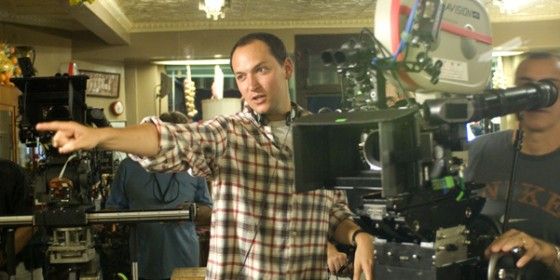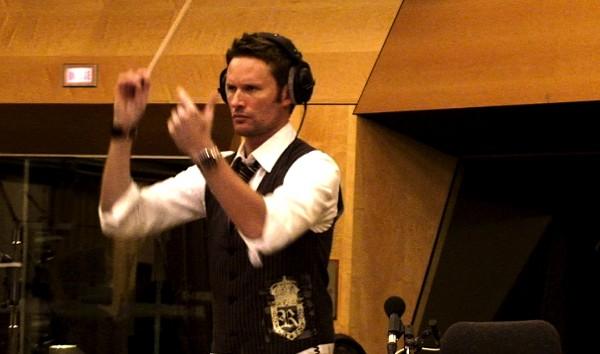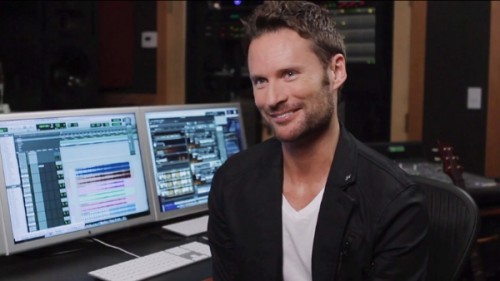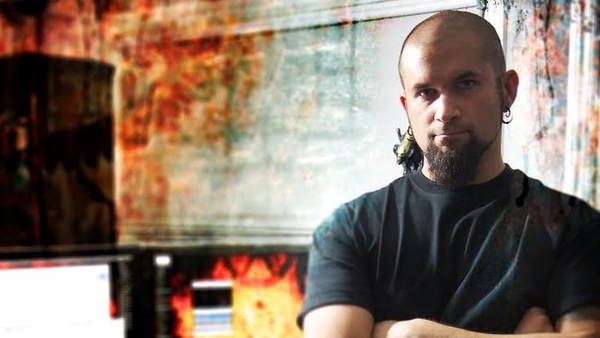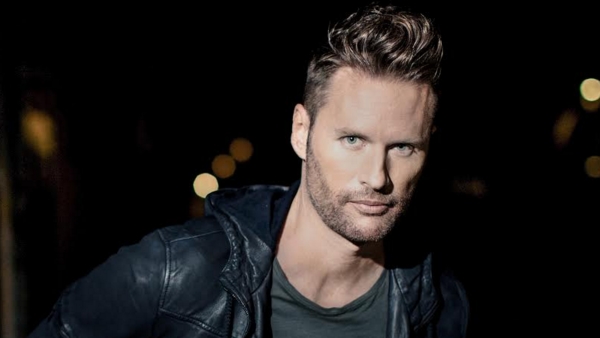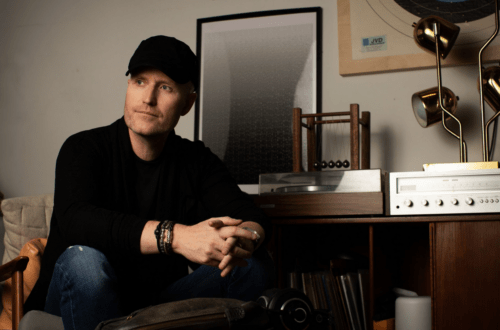 Brian Tyler is a film composer who is no stranger to high energy and action-oriented films. In fact there’s not a lot on his resume that isn’t an adrenaline-fueled thrill ride. This May audiences got a taste of Brian’s unique musical styling in both Shane Black’s Iron Man 3 and Louis Leterrier’s Now You See Me. They are two vastly different films with two distinct musical themes but they share one thing in common; they feature score that are more engaging, bold and fun that the events playing out on screen.
Brian Tyler is a film composer who is no stranger to high energy and action-oriented films. In fact there’s not a lot on his resume that isn’t an adrenaline-fueled thrill ride. This May audiences got a taste of Brian’s unique musical styling in both Shane Black’s Iron Man 3 and Louis Leterrier’s Now You See Me. They are two vastly different films with two distinct musical themes but they share one thing in common; they feature score that are more engaging, bold and fun that the events playing out on screen.
Brian’s music, time and again, walks the line between a sleek sophistication and something that effortlessly raises pulses. We got the chance to talk with Brian about his latest projects but also find a little more about what makes him one of the hottest composers currently working. He had a lot to say and this uberly talented musician (seriously, he plays at least 40 instruments) is a star on the rise in Hollywood circles and a real rock star in the action genre. If you don’t know him by now, you should. His current work as well as his high-profile projects coming down the pike are sure to continue making him a household name.
——————————————————————————————————————————-
– Thanks so much for meeting with us today Brian. Just want to say I’m a big fan so I’ll go ahead and get that out of the way up front.
*Laughs* Thank you man. Glad to hear it.
– You have two movies that you scored which come out this month. They’re both amazing soundtracks so I’ll ask you, which one do you want to talk about first?
I like them both so I’ll let you pick.
– OK, let’s go with Iron Man 3. That was everything a modern superhero film needed be. It’s bold, it’s emotional, it’s epic, really catchy and just superb, so tell me about when you got on board and what was it like working with Shane Black?
I came in to the project while they were still shooting and I read the script and thought it was great and I’ve been a big fan of Shane from Kiss Kiss Bang Bang and his scripts and just think he’s a great guy. We had been looking to work together and were just waiting for the right project, so when we all started talking about the story and what we wanted from the music for Iron Man in this post-Avengers world we thought that we really wanted to go for some kind of classic theme-driven music for the score. We were just kind of speaking the same language. Now Shane is a really brilliant guy and he’s a great writer but he has a great musical mind as well as does the entire group over at Marvel, they’re very music driven. We all just clicked and that’s kind of how it all came to be.
– This is a sequel, so do you ever think about oming in late in a series or having to tread the same ground that’s been established by someone else – kind of like what you did with Rambo? What kind of difficulties do you run into when there’s already existing material out there?
Well it depends on the project, it really does because it can go so many different ways. For instance with Rambo you have something that’s associated with trying to keep a character echoing the past. It’s like Rambo is haunted by the past so you want to have that Jerry Goldsmith theme resonating in there as well as new music to bring it into the modern realm of where the character went. But with something like Iron Man you have two distinct chapters here with Iron Man 1 & 2 then The Avengers and onward where the character is such a different person. Tony Stark is completely evolved and the surroundings have changed where he has graduated to becoming a full blown superhero, albeit a reluctant one, at the same time. So with a series like Iron Man where you have some great music that came in Iron Man 1 & 2 those scores were by design and we took it in a different direction with the third one because the story called for it. But there’s certainly a nod to that music and we wanted to keep the Tony Starkness of it there from before because he is such a newly minted, full-blown superhero you had to focus on that in this particular score.
– A lot of what the first Iron Man focused on was trying to ground a larger than life hero, but like you said Tony is an evolved and post-Avengers hero, so working with someone like Shane Black and his humor/sensibilities did you try to make this more fun? I mean that end track “Can You Dig It” really epitomizes Tony and brings the score home in addition to being an exceptional piece of music (click here to listen to the amazing track).
Yeah, you know, when it was time to have fun we completely wanted to let loose and that was something that wasn’t a completely different tone but the idea of it, having fun in this post-Avengers world where things are even more serious, you needed something even further out than the AC/DC vibe and the Black Sabbath vibe that was really driving the first films with that rocking vibe. So instead of going for a song that existed we decided to do our own song that was based on the Iron Man 3 theme but was more fun in a sense instead of just rocking out and that’s where that throwback to the 60’s, go-go dancing sound came from for “Can You Dig It” and that encapsulates how Iron Man 3 is different. The score is more serious and more grave in terms of story which is why we wanted to go so far out in the other direction to help counterbalance the darkness that’s in the rest of the film. It’s great for me because I get to go to both extremes and take each as far as I want. It was great fun but also a huge challenge.
– I see what you mean. There’s a lot of depth and complexity to the score and it’s probably one of the reasons I’ve been listening to it non-stop since the Press screening. Sounds like you’re proud and you should be, it’s sensational work and one of the best superhero themes to date. So let’s move to Now You See Me which is equally great but very different. These films came out in the same month but did they overlap at all and if so was it difficult juggling the projects?
The timing on these was perfect in that I was finishing Iron Man 3 and I had just heard of Now You See Me in terms of them wanting me to come aboard so I was able to finish up Iron Man and transition right into it. The good thing about it is that the films are so incredibly different and like going into a completely different mode so switching gears was easy. I didn’t get much rest in between them *laughs* maybe a half day but still they were compartmentalized by a little bit of time and it made it easier to write music that was so vastly different from anything I’d done before.
– Now You See Me has this aura about it, it’s got a coolness but with some edge, like Fast 5 meets Tron: Legacy. How did you come across developing that sound?
It’s really a true merging of different styles. There’s a modern string to it kind of reflecting that it’s a caper but a modern caper. They’re using technology and all sorts of things like that in the film but at the same time
they’re illusionists by trade and capers tend to have, when you think of caper films, a kind of throwback sound. There’s kind of that vibe of live music that goes into it so there’s as much 60’s James Bond and Henry Mancini’s Charade influence in that score as there is anything that is modern so you have these very different styles pulling at you. I play the drums and the vibraphone on the score and I’ve got all sorts of other instruments that have existed since the 40’s or 50’s like an upright bass, congas and piano. It was kind of like an old-school type of band recording and that was combined with the London Philharmonic for the orchestral sound and you just do it with a modern energy but not so much on the instruments, the instruments remain kind of classic so it is such a hybrid of different things. Certainly one thing to always keep in mind is the magical element of it so you have nods to movies that are literally about magic, things like Harry Potter that have that sense of wonderment and mystery. But at the same time elements that have very great action through-lines and I sometimes even have trouble defining what genre it is when someone asks me what the film is. “Well it’s a caper that’s an action movie but it’s a comedy and a heist film with magicians”. It all seems very natural when you watch the film but when I started writing the music I thought to myself, woah I have never encountered a puzzle like this before.
– You put a lot of yourself into your scores and create a great unique sound but at the end of the day it’s director telling you “yes, give me more” or “no, this is all wrong”. So how do someone like Shane Black and Louis Leterrier’s specific directing styles help you work?
Shane and Louis are really great collaborators and they’re both very musical. Shane is a brilliant guy and a walking encyclopedia of being able to name scores just from the melodies and so is Louis. He’s actually a drummer and he really understands the mechanics and the feel of music. Even the producers Alex Kurtzman and Rob Orci are big music fans and so they both help inform the score in the right way and are supportive and great to work with. I consider them friends and that’s who you want when you’re in the trenches and you have time crunches and you have the stress of having expensive movies relying on you *laughs* so it’s great to have that kind of encouragement as the film moved along.
– I know that every movie is most likely different but on a global scale when do you usually get involved in a project and do you always read a script before you take a project?
I typically do because most of the time I’m brought on very early in the film and so I’ve read scripts up to two years in advance. Often the script I read can change quite a lot by the time they film the movie. I think I’ve come a cross every scenario that’s possible. I’ve come in at the very end when they need a score and they’ve run out of time and I’ve done so many movies that I think I’ve hopped on board a film in every stage of development but for the most part I read every script before they begin filming or right when they start shooting to get some ideas in my head. When they get into editorial is when I usually get intimately involved in writing.
But I’ve also written things very far ahead as well. I get some ideas when reading the script and in fact I read the script so long ago for Now You See Me in fact that I wrote one of the themes but never played it for anyone. It came to me while reading and I went over to the piano, played it and that’s one of the main themes that’s actually in the movie and the first thing you hear on the soundtrack. But after writing that small bit, time went on and I didn’t start working on the rest until much later when they were working on the edit of the film. We needed something and so I pulled that bit out and it all kind of fell into place even though I hadn’t thought about it for some time. It can all just come together that way in the end and in so many different ways and so I don’t have a process that I prefer, I just like to go with the flow.
– Since you’re a musician at heart you seem to enjoy getting down and dirty and just create. You play a lot of instruments but how do you write music for instruments you don’t play and of those you do, what are your favorite instruments?
You know, it’s funny. Most composers don’t play a majority of instruments they write for which is kind of interesting. But that’s really part of it for me. I happened to have picked up a lot of instruments over the years. For one thing it is my weakness in terms of going to the music store and it’s really my great vice in life. I mean, just yesterday, well this would be the case any day but just yesterday I saw this mid 70’s Geddy Lee Fender precision bass that I thought was really cool and I had to buy it, so I did and it sounds great. But also I’ll see something I’ve never played before and I’ll think “ohh, I want that” and then I’ll buy it and learn it.
I don’t really have a favorite instrument though. I would say for me, writing on the piano is the most natural because I can use all ten fingers and I can get more rich harmonies, melodies and moving support lines that can support a melody all at once and I can hear more of what’s in my head all at once as opposed to playing a guitar or a cello or something like that. I really love playing the drums because it was my first instrument but I would say my main instrument isn’t really an instrument, is the orchestra overall. When I’m conducting I’m sort of playing the orchestra and that’s definitely the highlight of the recording process for me.
– In most of your videos you really look right at home at the drums so that makes perfect sense.
Yeah, that’s definitely the case. I love sitting on the kit. There’s a piece on Now You See Me, on the soundtrack it’s the second part of the track called “Now You See Me” that’s really crazy and I had a blast drumming that but it was very hard.
I think part of the reason for the really wild time signatures came from me knowing that I was composing the movie for a director who is a drummer and I think that was at the back of my head perhaps while I was writing some of the music.
– Going back to what you said before about seeing something and wanting to learn how to play it, I’m curious. Let’s say you have to do some kind of specific world music, something with a regional or indigenous sound, like Japanese for instance. How do you begin writing music for a style or series of instrument you aren’t familiar with. What kind of research do you do? Or do you hire someone who’s versed in that kind of music?
Well it can go in both directions and I have done a lot of movies where I have done both. I’ve done a lot of movies that take place in Asia; Thailand, Japan and then I’ve done movies that take place in the Middle East, Pakistan and India and areas that take place in a sort of deserty space like for Children of Dune so whenever I encounter those things and I want to have that world music element I do both of what you mention, the first being that I like to use and hire musicians that are from the area that I’m writing and I love to learn that kind of music because world music was something I loved studying in college and played in a lot of those ensembles so I could learn the different scales from different areas of the world and learn how to play those instruments. But certainly as I’m cruising along and doing music from different parts of the world invariably I end up also buying a lot of those instruments learning them as well.
I remember I was working a film and I got the great Urhu player Kwon Min Lee who came in and played and then I thought “I want to buy one of these” and obviously he’s the master at it but after a while if I buy something I feel like I always, at a certain point, want these great players around but in a pinch I can certainly get by after I’ve learned an instrument and I play a lot of those instruments all over my soundtracks including sitars and tanburs and instruments like that. So it’s a little bit of both falling somewhere between wanting to learn from the maters and the fact that I just can’t help myself.
——————————————————————————————————————————-
Brian had so much to say about his process and his passion scoring film music during our conversation that I felt that, once transcribed, it should be split right down the middle. So click here to read what else Brian had to say about his craft in Part II of our exclusive interview with this amazing musician.

